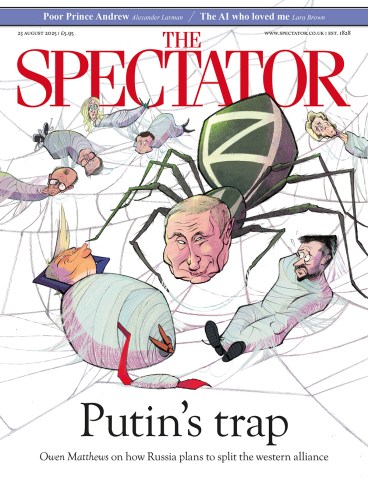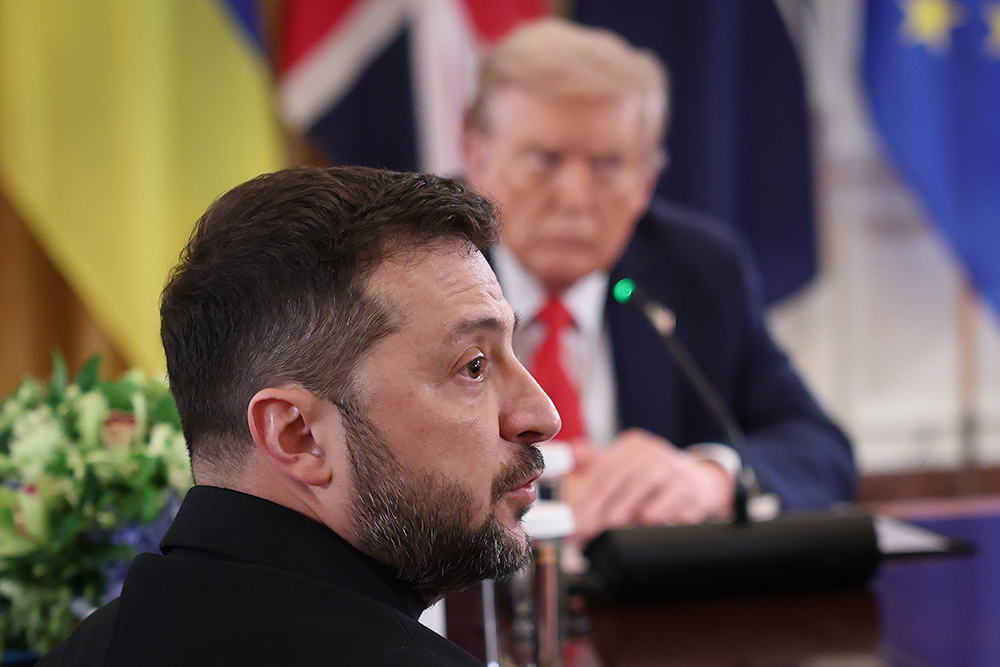
On Volodymyr Zelensky’s last visit to the White House, he brought a gift: a championship belt from one of Ukraine’s boxing legends. But talks collapsed before the gift-giving stage. This time, he brought a golf club from a wounded soldier and a letter from Olena Zelenska, Ukraine’s first lady, to Melania Trump. Donald Trump not only accepted them but reciprocated with symbolic ‘keys to the White House’. The exchange signalled that Trump, who once slammed the door on Ukraine, is now willing to listen, if the approach is right.
Just six months ago, Trump was ruling out any American role in guaranteeing peace in Ukraine. This week, such guarantees are at the centre of negotiations in Washington. Zelensky has offered to buy a $90 billion package of US weapons, funded by Europe, in exchange for a postwar security commitment from America. Trump has not hardened his stance on Russia, but he has grasped the leverage Ukraine offers him as mediator, dealmaker and eventual guarantor. For Zelensky, the challenge ahead will be converting this new openness into something lasting before Trump changes his mind.
In last week’s Alaska summit between Russia and the US, Vladimir Putin secured the most important concession from Trump: the chance to negotiate without a ceasefire. Russian bomber jets attacked the Ukrainian city of Kremenchuk as soon as Zelensky left the White House. Putin has been stalling the negotiations since March to give his troops time to advance on the battlefield. In Alaska, word is that Putin offered to stop the killing in return for the Donbas and the recognition of Crimea as Russian, among other demands.
But Zelensky has no legal power to redraw Ukraine’s borders, even if he were minded to. This is why it’s hard to see any peace treaty materialising when, in a few weeks, he and Putin meet for the first time since the 2022 invasion. Moscow and Kyiv remain miles apart on most issues and Putin’s strategy is to put forward conditions that he knows Ukraine can’t accept.
The mood in Ukraine is still combustible. According to recent polling, almost 70 per cent support a negotiated end to the war as soon as possible: a big shift from three years ago, when 73 per cent wanted to fight until victory. But the majority are still firmly against ceding territories to Russia.
Under Ukraine’s constitution, any deal that cedes land would need approval in a referendum. Polls show there is little to no chance of that happening – although it’s possible to see Ukrainians accepting a frozen conflict along the current front line. But withdrawing troops from the 2,500 square miles of the Donetsk region that are still under Ukrainian control (as Putin demands) is a non-starter. It would not just condemn hundreds of thousands of Ukrainians to Moscow’s occupation but also give Putin the ‘fortress belt’, the 30-mile defensive line comprising four cities and fortifications that he has failed to breach since 2014.
Iryna Gerashchenko, an opposition MP and co-chair of European Solidarity, the second largest party in the Ukrainian parliament, called on Zelensky not to reward Russian aggression. ‘Any concessions to the aggressor only open the way to a new war,’ she said. She participated in the 2015 Minsk negotiations, when Ukraine managed to secure a Russian signature beneath the promise to respect all Ukrainian borders, despite de facto occupation at the time. She warned Zelensky not to settle for anything less. ‘It is obvious that any agreements in Washington are shattered by Kremlin realities, because Putin is not going to change his plans to completely absorb Ukraine, to destroy Ukrainian identity and statehood,’ she said.
The belief that a peace deal without proper security means another war runs deep in Ukraine. In my trips to the front line, every soldier I spoke to was convinced of one thing: after this war, there will be another. Russia’s ultimate goal is to erase Ukrainian sovereignty. ‘The Russian war machine is not in a state to stop. It will keep rolling. It is too big,’ Vitaliy Lytvyn, the commander of the artillery division in the National Guard, told me in Pokrovsk a few months ago.
After Alaska, Trump said he had decided to go straight to a final deal rather than a ceasefire. It’s hard to see how long that will take. ‘President Trump has brokered on average about one peace deal or ceasefire per month during his six months in office,’ said Karoline Leavitt, the White House press secretary, last month. Whatever the accuracy of her claim, it speaks to his self-image of a peacemaker. If he is to broker a peace deal now, he will need to secure binding, enforceable guarantees that stop Putin from regrouping and returning for the third time. There is more hope than ever before that this is understood in Trump’s White House. And that, for Zelensky, is progress.








Comments